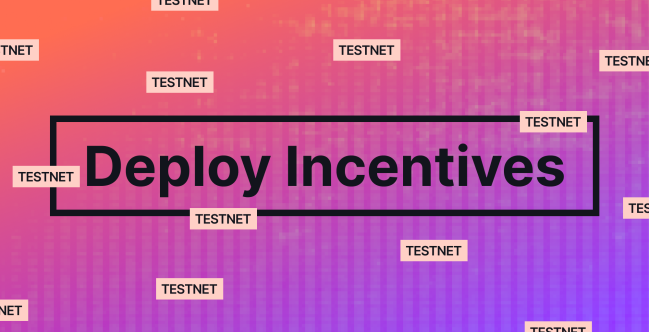
Testnet 3 Phase III Deploy Incentives Retrospective
The wait is finally over! Our committee has concluded its review of all Deploy Incentive submissions and selected the top 10 winners receiving our prize pool of 5M Aleo Credits. We’re also excited to announce that we will allocate another 1M Aleo Credits to 40 additional high-quality submissions.
Recap: The purpose of Deploy Incentives
Aleo launched Deploy Incentives during Testnet 3 Phase III to encourage developers to write and deploy applications on the network. We aimed to drive organic use of the Aleo protocol and create an initial set of useful programs for our on-chain program registry.
Deploy Incentives are critical because they encourage builders to demonstrate their ability to harness the power of zero-knowledge (ZK) technology to build private, programmable applications on the web. In particular, we wanted people to start building these applications using our ZK-enabled domain-specific language (DSL) and compiler, Leo. This allows us to introduce Leo to a wide range of developers and to test the limits of what is currently possible.
Program success: By the numbers
As many of you know, we announced these incentives on May 2, 2023. Initially, we launched a hands-on support program where Aleo core team members offered feedback and technical guidance for early entrants. This one-on-one support initiative was well received as it enabled experimentation on the network before a critical network upgrade. It also provided applicants with personalized feedback on their projects. During this period, we received around 190 feedback requests. This was extremely exciting and a precursor for what was to come.
Following our announcement, we officially launched the Deploy Incentives program and accepted submissions from June 21, 2023 to August 21, 2023. These dates represented the snapshot for qualifying submissions that can earn rewards. At the conclusion of the incentives program, we had 1000+ valid submissions (excluding spam). We then narrowed down those with fully unique GitHub repos to 130 submissions. The breakdown of these submissions by category is as follows:

We further refined this total by identifying the highest-quality projects we deemed worthy of review by our committee. This constituted 50 submissions.
For these submissions, we applied our scoring & voting methodology to determine the Top 10 winners. It’s important to note that the committee comprised Aleo ambassadors and core team members. Ambassador scoring & voting accounted for 66.66% of the overall outcome, while core team voting & scoring accounted for 33.33%. Please reference our public review guide for more information on the in-depth details of this process and methodology.
Announcing the winners: The Top 10
As noted in previous communications, Aleo is allocating 5M Aleo Credits from our mainnet launch starting supply to the Top 10 winners of Deploy Incentives. The exact breakdown of the reward distribution can be seen below:

Deciding on the shortlist of the Top 10 submissions was no easy task. There were so many high-quality submissions; voting came down to the wire in many cases. That’s why we’ve decided to allocate an additional 1M Aleo Credits to 40 more projects from the Top 50. We were genuinely impressed with the submissions and will be distributing this additional award evenly. That means each of the 40 projects will receive 25K Aleo Credits.
Before announcing the winners, we’d like to thank everybody who participated in the program! This would not be a success without all of your contributions.
Without further ado, here are the winners:

Key takeaways: What we learned
Throughout the course of the Deploy Incentives program, our team gathered invaluable feedback that helped us make improvements to both Leo and the Aleo core protocol. This resulted from direct user feedback around technical challenges, assessing feature requests, and stress testing the network with real-world applications.
Some direct impacts influenced by deploy incentives include, but are not limited to:
Adding the self.signer opcode to the Leo programming language. This was heavily requested by many Deploy Incentives participants and originated from ARC-30.
A handful of bugs related to the Aleo core protocol were discovered. These were addressed through our Bug Bounty Program on HackerOne.
Many of the programs deployed during these incentives leveraged each other. In particular, many used art_factory by Demox Labs for NFT-related projects. Composability is a core feature of Aleo, and the use of this program demonstrated that.
Improving our developer documentation to make it more detailed for people wanting to build on the network.
Updating the Aleo SDK to make it more robust. More specifically, adding the create-aleo-app functionality so people can spin up a front-end for an application more easily.
As a private-by-default Layer-1 blockchain that is programmatically compliant and built entirely from the ground up, understanding how real-world applications function under live network conditions is of the utmost importance. Creating the core infrastructure to enable the next generation of the Internet is no easy feat. Incentive programs like these are critical for understanding what it will take to get us there.
What’s next: Charging towards mainnet launch
The primary focus for Aleo in the coming months is to officially launch mainnet. Throughout all of the Testnet 3 incentive programs, we’ve had the opportunity to learn how both Provers and Developers function in a live environment. The final group of network participants that we need to test are Validators.
For Testnet 3, we’ve onboarded 55 validators based on an application we publicized a few months ago. These validators will have the opportunity to run on the network and earn incentives for their participation. These incentives aim to stress test our consensus mechanism AleoBFT and find any attack vectors that could impact mainnet.
We will be sharing more details on this incentive program soon and publishing the results once these validators have completed the process.
Disclaimer: Claiming rewards
Rewards for Testnet 3 Phase III Deploy Incentives will be allocated to the winning teams highlighted in this blog post. Our committee will contact you directly about next steps using the information you provided when submitting your application.
As a reminder, all winners must successfully complete a KYC/AML and pass OFAC screening. In addition, if you are a US or Canadian citizen, you must also be an accredited investor.
Aleo Credits received during Testnet 3 will be distributed as part of Aleo’s mainnet launch. They are to be used as a payment mechanism for services on the Aleo mainnet. They are not investments nor investment vehicles, and they should not be treated as such; their value is simply their utility for mainnet functionality. By claiming your rewards, you represent, warrant, and acknowledge that:
You are not acquiring Aleo Credits as an investment and have no expectation of economic benefit or profit as a holder of Aleo Credits
You are not relying on Aleo or any of its employees or representatives in any way
You are not acquiring any equity or other ownership interest in Aleo by owning Aleo Credits
You will not portray Aleo Credits as an investment or an opportunity to obtain an economic benefit or profit
Deploy Incentives participants are also subject to Aleo’s Ecosystem Contributor Program Terms of Service. Please make sure to read these terms if you haven’t done so already.
About Aleo
Our blog features the stories of developer and privacy advocates building a better internet with zero knowledge.
For further information contact us at hello@aleo.org


